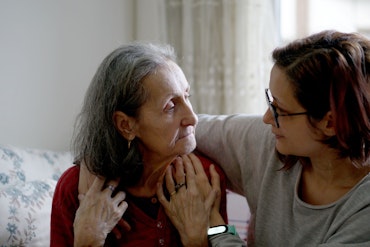“Government putting dollar signs before lives” as RN bill voted down in NSW
A New South Wales bill to ensure aged care residents have 24 hour access to a Registered Nurse in state-run facilities was voted down last week.

The NSW parliament voted down a bill to ensure aged care residents have 24 hour access to a Registered Nurse (Source: Shuuterstock)
Orange MP Philip Donato, of the Shooters, Fishers and Farmers Party, introduced the legislation into the NSW state parliament last week.
The bill passed the upper house unanimously on the 4th of May, but was defeated 45 to 35 in the Lower house on Thursday.
“I’m disappointed that it was voted down especially considering it was passed unopposed through the upper house a week earlier,” said Philip Donato.
“People in aged care should receive the best possible care available, especially those with high needs, who should have access to a Registered Nurse 24/7”
General Secretary of the NSW Nurses and Midwives’ Association (NSWNMA), Brett Holmes, said the government’s decision was shameful and over time would erode the level of quality care provided to some of the state’s most vulnerable aged care residents.
“This is a tragic outcome for families with loved ones in high care residential aged care facilities across NSW and is a clear abrogation of responsibility by the Health Minister and Nationals MPs purporting to represent rural communities,” Mr Holmes said.
While the government has argued that small facilities wouldn’t survive if the legislation passed, Mr Holmes rejected those claims, calling the argument “ill-informed.”
Philip Donato told Talking Aged Care that it was disappointing that “the government put dollar signs before lives.”
Registered Nurses were legally required to be available in NSW aged care facilities until federal legislation removed the requirement in 2015, a move that the Greens warned would put older Australians at risk.
Registered Nurses are highly trained and vital care workers in the sector, yet 62.5 percent of aged care facilities nationally report a shortage of RNs.
The National Aged Care Staffing and Skills Mix Project report, by the Australian Nursing and Midwifery Foundation, the Flinders University Research Team and the University of SA found that Registered Nurses should make up 30% of aged care staff in order to ensure safe care.
But lack of legislation that requires Registered Nurses on duty has led to falling numbers and unsafe practices.
In 2015, eight of the top 10 locations calling for an emergency ambulance were nursing homes, due to unavailability of registered nurses.
“Nationals MPs have essentially said their constituents don’t deserve a registered nurse on site 24 hours a day and therefore can be transferred by ambulance to the local public hospital or Multi-Purpose Service to wait in the emergency department for assessment and treatment,” said Mr Holmes.
Mr Donato said his party would not give up on having legislation passed, saying he would “continue to put pressure on the government.”























